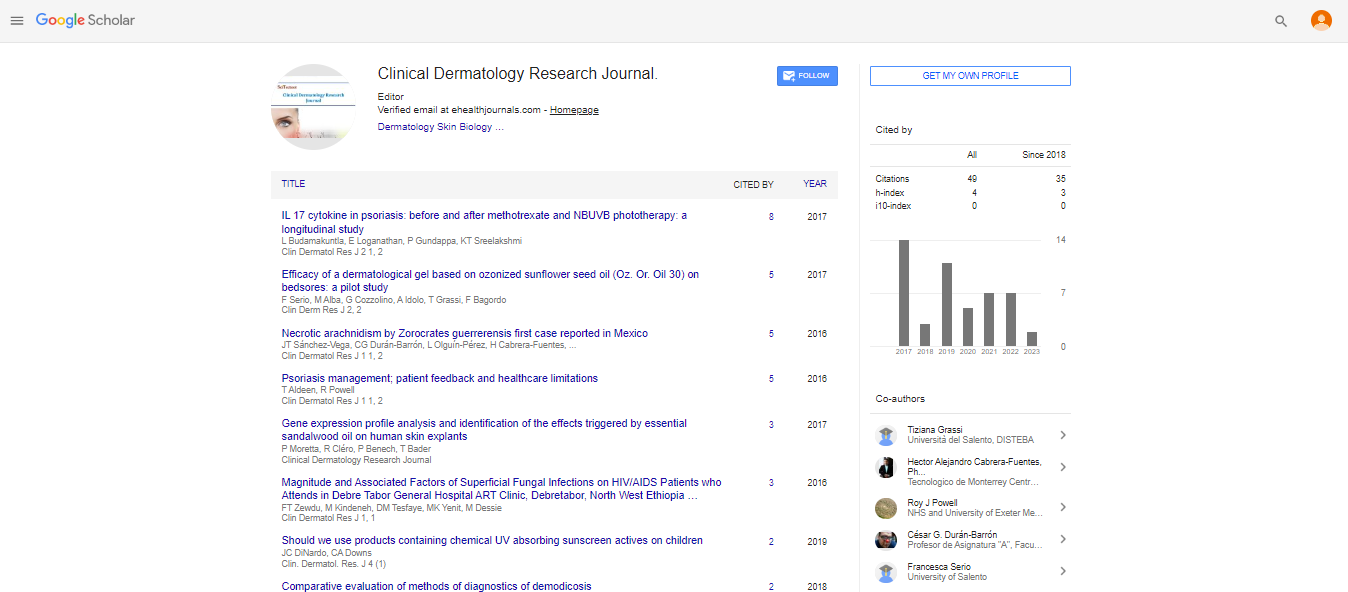E-BABE naturally secreted growth factors for aesthetics: Stimulating skin and hair follicle stem cells
Gail K. Naughton
Histogen Inc., USA
: J Clin Exp Dermatol Res
Abstract
Involved in regulating many cellular processes, growth factors are naturally secreted proteins that support proliferation and differentiation in cells throughout the body. Intrinsic and extrinsic aging of skin is associated with reduced levels of growth factors that are critical to normal skin health. A novel bioengineered growth factor composition was developed by Histogen Inc. utilizing hypoxia-induced human multipotent stem cells grown in closed suspension bioreactors to produce Cell Conditioned Media (CCM) and has been shown to stimulate mature skin cells and dermal stem cells and upregulate collagen and elastin production in the body. Topical application of the formulated CCM in a randomized trial showed statistically significant reduction in the appearance of fine lines (p<0.001), coarse winkles (p<0.024), a reduction in pore size (p<0.01) and an increase in elasticity (p<0.015) and skin radiance (0<0.007) and an overall improvement in appearance (p<0.009) at 90 days. Additional studies have shown that the CCM can speed up healing and reduce inflammation when applied post-resurfacing. Since Histogen’s unique manufacturing process also results in upregulation of growth factors, such as follistatin, which have been shown to be important in hair viability and hair follicle stem cell proliferation, a formulation of the CCM, known as Hair Stimulating Complex (HSC) has been studied as an injectable for hair growth. We have developed a biopotency assay based on measuring the physiological response, as measured by the degree of proliferation of cultured human Outer Root Sheath (ORS) cells of the cutaneous hair follicle using colorimetric metabolic dyes. Greatest ORS proliferation correlates with product demonstrating clinical efficacy thereby providing a predictive bioassay for ongoing and future clinical studies. Two clinical trials of HSC have been completed, showing cosmetically relevant new hair growth and an excellent safety profile. The initial clinical pilot study was a single site, double-blind, randomized, placebo-controlled trial involving 26 males with androgenetic alopecia. At baseline one area of the scalp received four 0.1 cc intradermal injections of HSC with placebo receiving identical treatment. HSC reached all of its safety and efficacy endpoints and showed a statistically significant increase at 3 months in hair shaft thickness (p<0.05) and hair density (p<0.03) and a continued increase in terminal hairs at 1 year (p<0.03) as assessed by Trichoscan image analysis, supporting the hypothesis that HSC stimulates resting and miniaturizing follicles to increase hair growth. A Phase I/II 56 subject trial on androgenetic alopecia studied increased dosing, with 8 injections of HSC and placebo at baseline and a repeat dose at week 6. No severe product related adverse effects and no evidence of kidney, liver, or bone marrow toxicity were observed. In addition, statistical significance was noted in all efficacy endpoints which included an increase in total hair count (p=0.0013), terminal hairs (p=0.0135), vellus hairs (p=0.033) and cumulative thickness density (p=0.0026) at the twelve week primary endpoint. We ee of proliferation of cultured human Outer Root Sheath (ORS) cells of the cutaneous hair follicle using colorimetric metabolic dyes. Greatest ORS proliferation correlates with product demonstrating clinical efficacy thereby providing a predictive bioassay for ongoing and future clinical studies. Recently, a company sponsored phase 1b/2a study in 36 men was initiated in the U.S. with data expected by year-end. Naturally secreted growth factors represent an important new category in aesthetics and have been shown across clinical studies to stimulate skin and hair follicle stem cells with anti-aging benefits.
Biography
Gail K. Naughton, PhD, has spent over 30 years researching the tissue engineering process, holds over 105 U.S. and foreign patents and has founded two regenerative medicine companies. Her current venture, Histogen is focused on the development of products based on a novel biological platform that replaces and regenerates tissues in the body. She has brought several tissue engineered products to market including TransCyte for severe burns, Dermagraft for diabetic ulcers, aesthetic dermal filler Cosmederm/Cosmeplast and SkinMedica’s TNS for skin care. At Histogen, She developed a new growth factor skin care ingredient which was acquired by Allergan as part of its TNS line. She has been extensively published and a frequent speaker in the field of tissue engineering and regenerative medicine.
 Spanish
Spanish  Chinese
Chinese  Russian
Russian  German
German  French
French  Japanese
Japanese  Portuguese
Portuguese  Hindi
Hindi 

